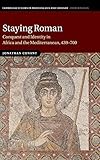Staying Roman : conquest and identity in Africa and the Mediterranean, 439-700 / Jonathan Conant.
Material type: TextSeries: Cambridge studies in medieval life and thought. Fourth series ; 082Publisher: Cambridge ; New York : Cambridge University Press, c2012Description: xviii, 438 pagine : illustrazioni ; 25 cmContent type:
TextSeries: Cambridge studies in medieval life and thought. Fourth series ; 082Publisher: Cambridge ; New York : Cambridge University Press, c2012Description: xviii, 438 pagine : illustrazioni ; 25 cmContent type: - testo (txt)
- senza mediazione (n)
- volume (nc)
- 9780521196970
- 9781107530720
- 939/.704 23
- DT 170.C65 2012
| Item type | Current library | Call number | Status | Barcode | |
|---|---|---|---|---|---|
 Opera (Magaz.)
Opera (Magaz.)
|
Biblioteca "Angelicum" Pont. Univ. S.Tommaso d'Aquino Temporary Library | DT 170.C65 2012 (Browse shelf(Opens below)) | Available | 0030219502 |
Include bibliografia (pagine 379-419) e indice.
Machine generated contents note: Introduction; 1. The legitimation of Vandal power; 2. Flight and communications; 3. The old ruling class under the Vandals; 4. New Rome, new Romans; 5. The Moorish alternative; 6. The dilemma of dissent; Aftermath; Conclusions.
"What did it mean to be Roman once the Roman Empire had collapsed in the West? Staying Roman examines Roman identities in the region of modern Tunisia and Algeria between the fifth-century Vandal conquest and the seventh-century Islamic invasions. Using historical, archaeological and epigraphic evidence, this study argues that the fracturing of the empire's political unity also led to a fracturing of Roman identity along political, cultural and religious lines, as individuals who continued to feel 'Roman' but who were no longer living under imperial rule sought to redefine what it was that connected them to their fellow Romans elsewhere. The resulting definitions of Romanness could overlap, but were not always mutually reinforcing. Significantly, in late antiquity Romanness had a practical value, and could be used in remarkably flexible ways to foster a sense of similarity or difference over space, time and ethnicity, in a wide variety of circumstances".
"In 416, when preaching a sermon on the psalms in late Roman Carthage, Augustine was able to ask his audience, 'Who now knows which nations in the Roman empire were what, when all have become Romans, and all are called Romans?'1 Yet already by the time Augustine addressed his Carthaginian audience the continued unity of the Roman Mediterranean was being called into question. The defeat and death of the Roman emperor Valens at Adrianople in 378 had set the stage for a new phase of conflict between the empire and its non-Roman neighbours; and over the course of the fifth century Roman power collapsed in the West, where it was succeeded by a number of sub-Roman kingdoms. Questions that had seemed trivial to Augustine were suddenly and painfully alive: what did it mean to be 'Roman' in the changed circumstances of the fifth and later centuries? And (from a twenty-first-century perspective) what became of the idea of Romanness in the West once Roman power collapsed?".


